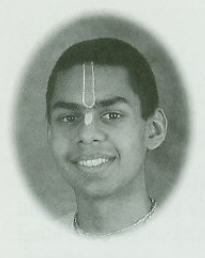
Ravi Gupta
THIRTY YEARS AGO Srila Prabhupada came to America to spread the Krsna consciousness movement. Although he had tried hard in India to interest his countrymen in Lord Caitanya's message, they had mostly ignored him. But in the twelve years that followed Prabhupada's arrival in America, Prabhupada made a great contribution to India and to his countrymen. Many Indians now realize this. I asked several members of our Indian congregation in Boise this question: What is Srila Prabhupada's contribution to you and to the Indian community? Here are their answers.
Sudhir Goyal, a hydrologist, was a dedicated Indian nationalist. He was a member of the RSS (Rashtriya Svayamsevak Sangh) and deeply wanted to spread India's glory. But when he came to know about Srila Prabhupada and his teachings, in Boise, his ideas of nationalism completely changed. He found what he was truly searching for. He says, "Srila Prabhupada gave me true nationalism not on a political platform but a spiritual one. India is on the top in its spiritual knowledge. This is India's real glory. And it is my duty to distribute that spiritual knowledge to the whole world, as Lord Caitanya instructed. Then I must serve my own country by taking this knowledge back to India. That service was part of Prabhupada's mission."
As Srila Prabhupada said, he did not come to the West to take wealth, technology, or education, as most Indians do, but he came to give his culture to the West. Prabhupada took nothing for himself, yet he gave the world the jewel of Vedic culture. Many times Prabhupada said that what India really has to give the world is her spiritual culture and this is where her real glory lies. So Srila Prabhupada was a true nationalist, because he not only kept to his Vedic culture but distributed it to everyone.
And by translating the Sanskrit scriptures into English, Srila Prabhupada made them accessible to all, says Ravi Iyer, an electronics engineer. "In other temples we did the rituals in Sanskrit, but we did not understand what we were doing."
Seema Raj, a TV journalist, adds, "Without Srila Prabhupada, Krsna would have been in India and remained there, but Prabhupada made Him world famous. Full credit goes to Prabhupada."
But even in India and to Indians, says Sudhir Goyal, Srila Prabhupada gave back the Vedic culture in a much more pure and coherent form. Sudhir describes his own experience: "Before I knew about Srila Prabhupada, I had hundreds of unanswered questions in my mind, such as the purpose of the caste system, cow worship, 'idol' worship, and so on. Prabhupada gave answers in a much more meaningful and understandable way than I ever knew."
My father, Anantarupa Dasa, had a similar experience. When he first came to the U.S., many people would ask him for the reasons behind what they saw as absurdities in Indian culture. Only when he read Srila Prabhupada's books did my father find logical and convincing answers, free from the confusion of modern Hinduism.
For many Indians, Srila Prabhupada's movement and teachings are a way to come back to their original culture. Manisha Mittal, a physician, describes how, because of Prabhupada's teachings, she and her family "started thinking again about lost values." They became vegetarians again and spent more time worshiping the Lord than they ever did. One of Prabhupada's greatest contributions, she says, was to her children. "Our children knew about Lord Krsna and Lord Rama, but Their lives were just stories. By Prabhupada's mercy, all that changed. Now our children are more proud and aware of who they are and can say it without hesitating."
Sudhir Goyal agrees. "We may have had an inheritance of Vedic culture, but our children, if not for Srila Prabhupada, would have never known about the philosophy and culture." His son Ayush is a good example of what Prabhupada gave the younger generation. Ayush, age seven, has memorized 108 verses of the Bhagavad-gita. He holds programs on Indian culture at his school and is able to talk to his teachers about Krsna conscious philosophy. Several Indians in our congregation come to our center mainly to perpetuate their culture in their children.
Overall, Srila Prabhupada's contribution to Indians and the world was incalculable. As Ramaa Murli says, "He was not an ordinary human being. What he did was beyond human capacity."
And what allowed Srila Prabhupada to do so much? It was his devotion to Lord Krsna and his dedication. He had no selfish motives but simply wanted to serve the Lord.
Mukta Sood, the principal of a local private kindergarten who has been coming to our center since it opened ten years ago, says, "Srila Prabhupada is different from all other gurus. He did not come here to collect big money like other swamis. He wasn't money-minded. With what he did he could have made a fortune for himself. But he was very simple. For himself he just had a few possessions, and he slept just four hours. Yet he came here and started a movement and made so many temples. He did more than a man can do."
Pam Issuree, a public-school teacher, says it well: "In Srila Prabhupada I see a person who is totally spiritual. He epitomizes the spiritual aspect of a person. He is someone who lives nothing but spirituality."
Now, in Srila Prabhupada's centennial year, it is our turn to glorify Srila Prabhupada by giving the whole world what he gave us. How? Give someone a plate of prasadam or a Bhagavad-gita As It Is, or invite people for a kirtana in your home. That will surely please Srila Prabhupada.
Ravi Gupta, age fourteen, lives at the Hare Krsna center in Boise, Idaho. The center is run by his parents. Ravi, who was schooled at home, is a second-year student at Boise State University.
